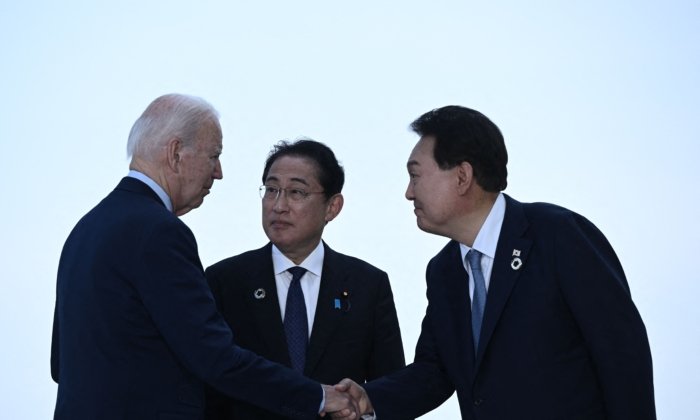Amid Changing Geopolitical Landscape, South Korea, Japan, and US Strengthen Partnership
South Korean President Yoon Suk Yeol delivered a speech on Aug. 15 in Seoul to commemorate the National Liberation Day of Korea. In contrast to his previous speech, President Yoon did not address the historical disputes between Japan and South Korea. Instead, he depicted Japan as a partner among free and democratic nations. President Yoon also emphasized the significance of trilateral cooperation between the United States, South Korea, and Japan. While he did not advocate for the reunification of North and South Korea, he did criticize the totalitarian communist state multiple times. This year marks the 70th anniversary of both the Korean Armistice Agreement and the Mutual Defense Treaty between the United States and South Korea.
President Yoon stated that the alliance between South Korea and the United States is based on shared values of freedom and democracy, and these shared values extend to Japan as well. He urged for cooperation between South Korea and Japan to contribute to peace and prosperity in the Korean Peninsula, as well as to counter the nuclear and missile threats posed by North Korea. On Aug. 18, President Yoon, alongside U.S. President Joe Biden and Japanese Prime Minister Fumio Kishida, held a summit at Camp David near Washington, marking a milestone in the geopolitical alliance between the three countries.
On Aug. 14, North Korean state media reported that leader Kim Jong Un inspected weapons factories producing “tactical missiles” and mobile missile launching devices over a two-day period. Kim Jong Un announced the objective of enhancing the capability of existing ballistic missiles and equipping their armed forces. This was the second instance this year where North Korea reported on Kim Jong Un’s inspection of military facilities. On Aug. 21, the United States and South Korea conducted joint military exercises, during which North Korea showcased its military might. Taiwan’s United Daily News speculates that North Korea may be indicating its intention to export weapons to Russia.
In recent years, North Korea has accelerated its research and development of nuclear and advanced weapons. They have conducted numerous tests involving large-caliber rocket launchers, advanced cruise missiles, and new intercontinental ballistic missiles (ICBMs). In July, Kim Jong Un called for the mass production of cutting-edge strategic weapons engines to revolutionize the development of new strategic weapons.
Chinese Defence Minister General Li Shangfu made an unexpected visit to the Moscow Conference on International Security on Aug. 15, just prior to the trilateral summit between the leaders of the United States, Japan, and South Korea. This marked his second visit to Russia this year. During the conference, Gen. Li met with Russian Defence Minister General Sergei Shoigu. It was reported that Gen. Li claimed that the strategic partnership between China and Russia has entered a new era and continues to progress steadily, while Gen. Shoigu stated that Russia and China have not only become allies but have surpassed the level of a strategic relationship in all aspects. The two defense ministers reached an implicit agreement on the Taiwan issue, asserting that the West is exacerbating tensions surrounding Taiwan. Following his visit to Russia, Gen. Li visited Belarus on Aug.16 and engaged in talks with Belarusian Defence Minister General Viktor Khrenin. Both nations sought to expand military cooperation, with Belarusian President Alexander Lukashenko announcing plans for joint military exercises between the two countries next year.
Meanwhile, the Chinese Communist Party (CCP) has deepened its alliance with North Korea. On July 27, North Korea celebrated its “Victory Day,” with CCP Politburo member Li Hongzhong and Russian Defence Minister Gen. Shoigu attending the event, showcasing an authoritarian trilateral alliance aimed at countering the United States and its allies. As U.S.-China relations continue to deteriorate, analysis suggests that China, North Korea, and Russia will display greater solidarity in opposing U.S. Indo-Pacific strategy.
During a political fundraiser on Aug. 10, President Biden referred to China’s economy as a “ticking time bomb,” adding that when authoritarian regimes face domestic crises, they often resort to military aggression. On Aug. 17, Japan’s Ministry of Defence reported that 11 warships from China and Russia sailed north from the Pacific Ocean to the East China Sea, passing between Japan’s Okinawa Island and Komiyajima. This marked the first time in history that warships from both countries traversed between two Japanese islands together. Japan viewed this as a threat and a security risk, and will continue to monitor its waters closely. An opinion piece published by The New York Times on Aug. 15 observed that as power goes to their heads, Chinese leader Xi Jinping and Russian President Vladimir Putin have become increasingly repressive and aggressive. The article mentioned their ambitions to redraw the map of Eurasia, whether in Ukraine or Taiwan, implying that diplomatic efforts are unlikely to alter their intentions.
Source link




